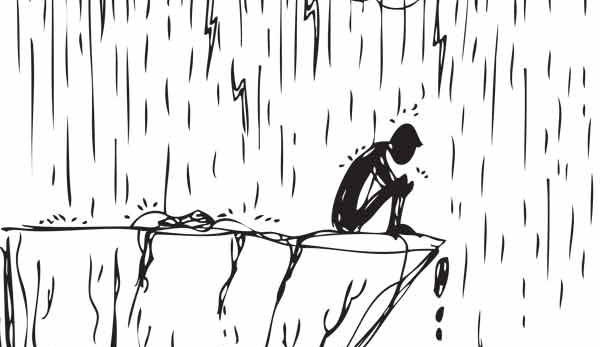Dueling With Depression: Recovery is Not Linear

You’ve probably seen the graphic. Usually it’s hand drawn. There’s a straight arrow that runs unbroken from the bottom left of a graph to the top right, with the word success at the top. Below it reads, what people think success looks like.
There’s a second graph that reads, what success really looks like. The hand-drawn arrow is now a frenzied scrawl, twisting and turning into huge, constricted knots where the arrow peeks out at the top, at success.
Those frenzied scribbles represent all the failures and dead ends: maybe it’s a drawer full of rejection letters from publishers, maybe it’s a failed investment, or maybe it’s all the hours spent at shitty jobs to pay bills instead of nurturing creative outlets.
Success truly isn’t linear, and the secret to getting there is to not to beat yourself up too much when that arrow suddenly takes a U-turn into Shitsville.
I’ve heard several times in writing groups to “give yourself permission to suck.” William Faulkner didn’t pen The Sound and the Fury in a single day with no editing (though supposedly he often wrote naked, so maybe that’s the trick).
I’ve discovered that the same concept applies to working towards my own recovery from depression and anxiety. If I were to draw that path on a graph, the scribbles, twists, and turns would fill the entire page with black ink.
I’ve gotten absolutely wasted after swearing I would quit drinking because of what I call depressive hangovers—for weeks I barely tread water in that dark ocean of gloom brought on by the drinking.
Anxiety still clouds my judgement by filtering out positive experiences and focusing singularly on past traumas. Sometimes I won’t eat the entire day, knowing that the lack of nutrition only exacerbates anxious thoughts.
In the process of recovery, I’ve failed. I’ve forgotten to meditate before work. I’ve stopped taking meds because of the side effects. I’ve just been lazy and avoided engaging in any coping strategies (like ducking the gym).
But again, a crucial component in mental-health recovery is levying a great deal of compassion and forgiveness toward the self.
I’ve spoken to so many people who struggle with depression who are also some of the most kindhearted and empathetic beings on planet Earth . . . maybe in the entire Milky Way Galaxy.
These are selfless peeps with hearts the size of Pikes Peak who are willing to help you paint, or take you to the airport at five in the morning, or help you move into that trendy 5th-story apartment in a building with no damn elevator.
I’ve witnessed these same magnanimous chaps being exceedingly hard on themselves, especially when they relapse: “I’m such a piece of shit for getting drunk, again!” “I slept on my couch for three days. I’m such a loser.” “I don’t deserve help. I only deserve to die.”
When working toward recovery, remember to give yourself permission to suck. No one is going to shake off depression in a single day with no editing. Allow yourself to pen multiple rough drafts of your life. Learn as much as you can when you end up taking a detour into Shitsville.
We all deserve some compassion, especially compassion that comes from ourselves.
What's Your Reaction?
Greetings. I’m Mike. People call me Mike. I’m just a gay guy trying to be creative before I’m kicked off this spinning, planet-sized spaceship hurdling through the void of space. Writing and photography are the creative outlets I spill my brain into when mental monsters start clawing at the back of my eyes. I only hope these articles provide readers with a few insights I’ve carefully gathered in cupped hands, cracked hands that have dueled for decades with these nebulous shadows that haunt so many lives. Plus, writing is a great way to pass the time on this planet-sized spaceship hurdling through the void of space.










